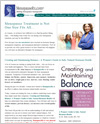Breaking News… on New Mammogram Recommendations
The medical staff at MenopauseRx, Inc. is more than a little surprised by the new recommendations of the U.S. Preventive Services Task Force (USPSTF). For the first time in 20 years, a government panel is telling women in there 40s to stop getting routine mammograms. The MenopauseRx staff is not alone in questioning these new guidelines.Many medical centers, breast cancer survivors, and thousands of health care providers, including doctors, are upset with these new recommendations.
“The new recommendations reduce women’s lives to numbers. The task force panel expressed concern that 1900 women age 40-49 will need to be screened with mammograms to save one life. That one life could be yours!”
See more at http://www.ez-llc.com/studio/eznewsletter/archive/9_248.htm
What are the Risk Factors for an underactive Thyroid (i.e. hypothyroidism)?
In the U.S., between 7 and 10% of the population over the age of 55 are affected by a thyroid disorder, with Caucasians more commonly affected than African-Americans. Females are 5-8 times more likely to have a thyroid disorder compared to men.
Hypothyroidism can be due to a variety of causes, including history of thyroid radiation, treatment for an overactive thyroid (Graves disease), removal of thyroid gland, and certain medications, such as lithium, amiodarone and iodine. The most common cause of hypothyroidism is a medical condition called Hashimoto’s thyroiditis.
What are the Symptoms of Hypothyroidism?
The symptoms of hypothyroidism can initially be very insidious. Some studies have found only 25-70% of elderly showing typical symptoms. A clinical exam does not establish the diagnosis in many cases. In fact, only 10% of patients with confirmed hypothyroidism were identified on a physical exam. The most important aspect of hypothyroidism is to be very cognizant regarding the subtle signs and symptoms that may develop. Alerting your physician to these signs and symptoms would allow laboratory testing to confirm the diagnosis.
Common symptoms include:
- dry skin
- hair loss
- cold intolerance
- confusion
- difficulty in concentrating
- constipation
- fatigue
- sluggishness
- hoarseness
- depression
- muscle cramps
- weight gain
- menstrual irregularities
Notice that many of these symptoms can easily be confused with menopause and perimenopause symptoms….Read on to help figure out how to diagnose a thyroid disorder.
Read more…
This month is National Osteoporosis Awareness and Prevention Month. MenopauseRx would like to remind women that osteoporosis is especially prominent after the menopause transition. Bone loss occurs during the perimenopause and after the menopause transition. Unfortunately, the can lead to an increased risk of a serious fracture. In fact, one out of every two women over the age of 50 will suffer from osteoporosis. The goal of enhanced awareness is to reduce the widespread prevalence of osteoporosis and associated fractures and to find a cure for the disease through programs of awareness, education, advocacy and research.
Learn more at: http://www.menopauserx.com/health_center/health_Osteoporosis.htm

Effisoy to help Menopause Symptoms
What is Soy?
You have likely heard a lot about soy and its wide range of health benefits including menopausal relief in the news lately. But what exactly is soy and what about soy is good for you?
‘Soy’, ‘soy protein’, ‘isoflavones’ and ‘phytoestrogens’ are commonly mentioned when discussing natural methods used to reduce menopause symptoms. Although there are similarities, there are also distinct differences between the various soy foods and supplements available.
Pertinent Points:
» Soy beans and other legumes contain isoflavones and are an important source of dietary phytoestrogens.
» Soy protein and soy isoflavones are not the same thing. Therefore, for optimal benefit of the soy isoflavone, it is important to ascertain the isoflavone content of any particular soy product or food chosen.
» Soy based compounds must be absorbed in sufficient quantities before they can have any effect in the body, which can cause the effectiveness of various products to differ.
Read more…
New eNewsletter Archive
 MenopauseRx has created an easy to use archive of our latest newsletters for quick and easy review.
MenopauseRx has created an easy to use archive of our latest newsletters for quick and easy review.
Here you’ll find past issues of our member’s only newsletters that contain news and study information related to your menopausal transition.
– To access the archive, click here.
Categories: Health, Hot Topics, HRT, Laboratory Testing, LifeStyle, Medical Updates, Menopause and Perimenopause Symptoms, Menopause and Perimenopause Treatments, Osteoporosis, Product/Supplement Review, Wellness Tags:
Did you know that vasomotor symptoms (hot flashes and night sweats) might last much longer than previously thought? This may impact the length of time many women will consider using hormone therapy.
A recent study by Cole, with 13 years of data on 438 women, found that the average length of symptoms lasted 5-6 years. This is a much longer duration than many clinical guidelines estimate symptoms to last. Most current guidelines mention that symptoms may last 6 month to 2 years.
Hot flashes and night sweats may adversely affect quality of life and the daily activities of women during the menopausal transition.
Read more at:
http://www.menopauserx.com/health_center/sym_hot_flashes.htm
Breaking News… on New Mammogram Recommendations
The medical staff at MenopauseRx, Inc. is more than a little surprised by the new recommendations of the U.S. Preventive Services Task Force (USPSTF). For the first time in 20 years, a government panel is telling women in there 40s to stop getting routine mammograms. The MenopauseRx staff is not alone in questioning these new guidelines. Many medical centers, breast cancer survivors, and thousands of health care providers, including doctors, are upset with these new recommendations.
Why did the USPSTF recommendations change?
Read more…
PITTSBURGH – – Although an increasing number of people are taking powerful new prescription drugs to treat osteoporosis, chances are the majority of patients are not getting the greatest effect from these medicines because they do not have an adequate calcium and vitamin D intake, according to a paper published in the March 2005 issue of The Journal of Women’s Health. John A. Sunyecz, M.D., president of MenopauseRx, Inc., who co-authored the paper, “Calcium’s Role in Osteoporosis Drug Therapy,” notes that many people being treated for osteoporosis mistakenly think their calcium and vitamin D intake is no longer important once prescription therapy begins. “People taking osteoporosis medications should remember that they do not contain calcium and have been proven most effective when taken with adequate calcium and vitamin D, usually achieved with the addition of supplements to the daily diet,” he explains.
“This paper builds on previous research published last year that shows physicians are not taking the clinical information we know about these drugs and putting it into practice when treating patients. From 1994 to 2003 there was a five-fold increase in prescriptions for bisphosphonates, however during that same time period, the percentage of osteoporosis patients who were treated with calcium supplements decreased by nearly 50 percent.”
Read more…
(NAPSI)-Here’s a fact that you may want to sleep on. According to the National Sleep Foundation, nearly 75 percent of women between the ages of 30 and 60 are not getting the eight hours of sleep they need.
Many women find it difficult to unwind at the end of the day and are left tossing and turning, trying to fall asleep and waking up in the middle of the night. Often blamed are hectic lifestyles filled with daily stress, anxiety and responsibilities, but there may be more to what’s keeping women up at night.
If you’re a woman between the ages of 35 and 55, you may be experiencing hormone fluctuations due to perimenopause and menopause, which can cause a number of physical and emotional changes including increased irritability, anxiety and night sweats. These changes may upset your body’s natural sleep pattern. In fact, according to a recent study, sleeplessness is the number-two complaint of menopausal women.
Researchers believe that lack of quality sleep may contribute to obesity, diabetes, immune system dysfunction as well as safety issues such as car accidents and medical errors, not to mention impaired job performance and productivity in other activities.
Read more…
#10: This is not your grandmother’s menopause
At the turn of the 19th century, a woman’s average life expectancy was 48.3 years. Most women did not live beyond their childbearing years. Today, if you are 45 years old, you can expect to live another 35-40 years. Some would say that it’s not natural for a woman to live so many years without the benefits of the hormones they had when they were younger. Menopause is a natural part of life, not a disease; you can expect to stay fit and healthy after menopause.
#9: Know what’s happening physically
Estrogen is necessary for reproduction and provides you with feminine characteristics. When your ovaries stop producing the hormones necessary for pregnancy your periods stop as well. Menopause is merely your last menstrual period. For many women, the changes leading to menopause begin a few years before their last period, and during this time of hormonal fluctuation, they may experience hot flashes, sleep disturbances, night sweats, palpitations, headaches, mood swings, and fatigue.
#8: Menopause can affect sexual function
Women experience the effects of menopause in a variety of ways. Lack of hormones can affect the lubrication of the vaginal wall. As a result, you might experience vaginal dryness that makes sexual intercourse painful. You shouldn’t have to have pain with intercourse.
Read more…




